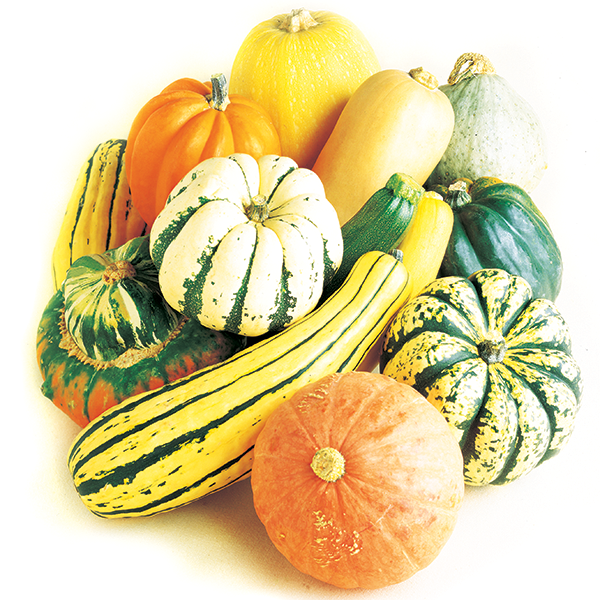PLUs
94750 acorn/table queen
94751 acorn, golden
94752 acorn, swan white table queen
93143 acorn, baby
94757 banana
94758 buttercup
94759 butternut
93142 carnival
93140 cucuzza
94764 dumpling (sweet)
94767 golden nugget
94768 hubbard
94769 kabocha
94773 patty pan/summer
94774 red kuri
94775 scallopini
94776 spaghetti
94777 sunburst (yellow)
94780 turban
94782 yellow, straightneck
94784 yellow, crookneck
94086 yellow zucchini/gold bar
94067 zucchini
93418 zucchini, round
Retail Price Data is based on USDA Specialty Crops Market News surveys.
Data collection ends on the report date and encompasses ad pricing good
from the Saturday before the report release date through the following Friday.
Weekly data - from over 400 retailers, comprising more than 30,000 individual
stores with online weekly advertised features - covers over 250 produce
items. Registered (logged-in) users, can access weekly reports and additional
market information.
USDA Specialty Crops Market News publishes FOB and Movement data on a daily and weekly
basis. Pricing and volume information is aggregated by commodity and published weekly,
subject to any source-data adjustments. Commodity data is further processed based on origin
(domestic vs imports) and type (regular vs. organic). Registered (logged-in) users, can access
weekly reports and additional market information.
Sales Strategies
Promote organic squash’s many health benefits along with its organic growing practices. Many consumers looking for squash are already health-conscious, so promoting the benefits of eating squash along with the sustainability of its growing practices may have broad appeal.
While squash is most often associated with the fall season, many types of squash are available year-round. Don’t limit your squash promotions to just the fall. Promote organic zucchini and yellow squash during the summer grilling season as they make a great grilling partner. Promote spaghetti squash year-round as a substitute for pasta in wheat-free meals. Winter squashes make great soups and are perfect for stuffing.
Dynamic Displays
Many varieties of squash are available as organic, so include a variety on your display. Offer preparation tips and recipes and clearly label each variety. Experiment with offering different varieties to find the ones that work best in your store.
Squash tends to take up a lot of space on the display so consider placing organic squash at one end of the display and conventional squash at the other end, with the appropriate barriers in between. This creates a large, eye-catching display that appeals to all squash shoppers.
Organic squash can be stacked, but keep your stacks short as larger stacks will crush the squash on the bottom and create the opportunity for squash to fall of the display.
Organic yellow and zucchini squash is a popular item for many consumers. Consider displaying it with other organic salad and cooking vegetables. Customers who might not be interested in other varieties of squash will find it more easily there.
In the Backroom
Shipping
All types of organic squash are available in a variety of shipping containers from 5-pound to 50-pound cartons.
Grades
Summer squash
U.S. No. 1
U.S. No. 2
Fall and winter squash
U.S. No. 1
Handling
- Temperature: soft, 41 to 50 F, 5 to 10 C; hard, 50 to 55 F, 10 to 13 C
- Relative humidity: soft, 95%; hard, 70-75%
- Mist: summer, lightly; winter, no
- Typical shelf life: soft, 7 to 14 days; hard, 30 to 180 days
- Ethylene-sensitive (Do not store or transport ethylene-sensitive items with commodities that produce ethylene.)
- Soft squash is highly sensitive to freezing injury. (Likely to suffer injury by one light freezing.)
- Hard squash is moderately susceptible to freezing injury (Able to recover from one or two light freezings.)
- Susceptible to chilling injury (Damage sometimes is not apparent until the produce is returned to a higher temperature.)
- Summer squash can be held at 32 to 40 F, 0 to 4.4 C for periods of less than four days. Use immediately after removing from refrigeration.
- Table queen and delicata will keep up to one month at 50 to 55 F, 10 to 13 C.
- Scallopini squash is more perishable. Refrigerate and use promptly.
- Do not can or freeze raw hard-shelled squash. However, cooked squash freezes well. Summer squash that has been frozen will turn to mush due to high water content.
- Refrigeration will change the flavor and texture of hard-shelled squash and high temperatures will cause deterioration.
Organic
1
